Multimodality: The Rise and Fall of AfrocentrismExploring how multimodal writing technologies contribute to the spreading as well as debunking Afrocentrism.
Don't wanna be here? Send us removal request.
Text
Afrocentricity: Academic Origins


Photo: Molefi Kete Asante.
Afrocenticity was founded by Molefi Kete Asante as he published his book Afrocentricity: The Theory of Social Change in 1980, followed by a series of publications exploring the same topic. According to Asante, Afrocentricity “is the study of the ideas and events from the standpoint of Africans as the key players rather than victims,” thus it is “Africa asserting itself intellectually and psychologically, breaking the bonds of Western domination in the mind as an analogue for breaking those bonds in every other field” (“The Afrocentric Idea in Education” 172). Afrocentricity manifests in a myriad of areas, including but not limited to: social, spiritual, traditional, ethnicity (Mazama 394). Afrocentricity, according to Mazama, is a paradigm, as “there is confusion in large part because scholars have often failed to approach Afrocentricity in a systematic manner” (390). The Department of Africology at Temple University, to which Asante belongs, is home to Afrocentricity and has trained plenty of scholars who have produced a lot of dissertations through Afrocentric inquiry. Among the most notable authors who have written about Afrocentricity are: Cheikh Anta Diop, Marimba Ani, John Henrik Clarke, and Chancellor Williams.
Today, the term “Afrocentrism,” a derivative of the term “Afrocentricity” coined by Asante in 1980, is popularly used by the public. Yehudah argues that “Pop-Culture Afrocentrism” is “an approach fashioned out of mainstream sound-bytes” that is an “often anti-intellectual and nonacademic misappropriation of [Afrocentricity’s] constructs” (551). He claims that the academic, Afrocentric inquiry is focused on Asante’s “location theory” (551), unlike the term “Afrocentrism”, which is used “to speak to anything that featured Black bodies” (552). Among the main beliefs associated with Afrocentricity/Afrocentrism is that the Ancient Egyptian culture, i.e. Kemet, is a Black culture – a claim that is featured in both: pop-culture and major academic projects, such as: Martin Bernal’s Black Athena project in three volumes (1987, 1991, 2006), Diop’s The African Origin of Civilization (1974), Asante’s The Egyptian Philosophers: Ancient African Voices from Imhotep to Akhenaten (2000), and the list goes on. My scope of research is focused on the manifestations of Afrocentrism in Pop-Culture and media, with a special emphasis on the Afrocentric pseudohistorical claim of the Blackness of the Ancient Egyptian heritage, which has been proven scientifically inaccurate with DNA tests. Nevertheless, the race of Ancient Egyptians and the origin of current Egyptians still poses a controversy on a lot of social media platforms as well as media depictions of Egyptians, and it has become a social media trend that is on the rise, especially in the 2020s. I will be mainly investigating the phenomenon of defending an obviously false claim on social media platforms and media productions, reflecting on the academic roots of such a feign belief, and the consequences such a widespread logical, historical, scientific, and cultural fallacy.
Literature Review
Pro-Afrocentrism
The main body of Afrocentric research promotes the different aspects of Afrocentricity as an ideology and a research method: mainly a historiographical, Black-centered retelling of history to highlight the achievements of the Black people, replacing the slavery narratives with other accomplishments that, according to them, the Western history telling robbed them of. The Afrocentrist approach mainly aims to liberate history from the Eurocentric view that is regarded as the main version of history. However, this approach might not totally align with the scientific methods of research, as it rather depends on presenting history in a way that promotes old African glory, even if their arguments are sometimes totally inaccurate or lack supporting evidence. Therefore, it is perceived as an unreliable academic approach that is used to manipulate proven historical in some aspects, which suggests an underlying agenda for the Afrocentric practices.
Anti-Afrocentrism
Being an extremely controversial academic approach, the reception of Afrocentricity has undoubtedly instigated a strong academic reaction from academics who totally disagree. Notable Anti-Afrocentric publications include: Mary Lefkowitz’s Not Out of Africa, Lefkowitz and Maclean-Rogers’ Black Athena Revisited, and Howe’s Afrocentrism: Mythical Pasts and Imagined Homes.
Just like the abovementioned books, Masonen’s article “Revolution has no use for savants” heavily critical of the Afrocentrist philosophy. The author argues that, academically, Afrocentrism is not a reliable research methodology, deeming it as an ‘apohistory’ and a socio-political movement that cannot replace the Western, scientific historiography as is based on the ethos (guilt, on the ‘white’ people’s part) rather than concrete facts. The main argument of the opposition to Afrocentrism is that it is based on hypotheses and not facts, thus it falsifies history and appropriates other cultures for the sake of glorifying the Black race’s historical presence, regardless of the accuracy of such a representation.
Research Gap
As demonstrated, the research done in this area is basically a comprehensive academic debate about Afrocentricity/Afrocentrism in definition and theory. In light of this controversial academic discussion, this research – written by an Egyptian academic who is evidently opposed to the Afrocentric claim of the Blackness of Ancient Egypt – aims to fill a research gap by exploring the multifaceted dynamics and adverse implications of this audacious, systematic, racism-driven theory. Afrocentrism is currently evident through (social) media hostility against modern Egyptians initiated by Afrocentric fanatics. Based on fictional retellings of history that state that Ancient Egyptians were black, Afrocentrists are not-so-subtly accusing modern Egyptians of being descendants of colonizers who do not own the land and history of Egypt due to the fairness of their skin color. Such an idea is starting to be accepted as the true version of history in the Western world in multiple realms of the media and cultural exhibitions, therefore this research is a reaction to such a cultural-appropriating trend to highlight its fallacies and set the record straight.
References:
Aidi, Hisham. “Egypt and the Afrocentrists: The Latest Round.” Africa Is a Country, 2022, africasacountry.com/2022/03/egypt-and-the-afrocentrists-the-latest-round#:~:text=By%20mid%2DFebruary%2C%20the%20One,of%20an%20abiding%20Arab%20racism.
Asante, Molefi Kete. “The Afrocentric Idea in Education.” The Journal of Negro Education, vol. 60, no. 2, 1991, pp. 170–80. JSTOR, https://doi.org/10.2307/2295608. Accessed 29 Sept. 2023.
Asante, Molefi Kete. Kemet, Afrocentricity and Knowledge. Africa World Press, 1992.
Bernal, Martin. Black Athena: The Afroasiatic Roots of Classical Civilization. Rutgers Univ. Pr, 2020.
Diop, Cheikh Anta. The African Origin of Civilization. 1974
Hanretta, Sean. “Egypt in Africa: William A. Brown and a liberating African history.” The Journal of African History, 2023, pp. 1–5, https://doi.org/10.1017/s0021853723000440.
Howe, Stephen. Afrocentrism: Mythical Pasts and Imagined Homes. Verso, 1999.
Lefkowitz, Mary R., and Guy Maclean-Rogers. Black Athena Revisited. The University of North Carolina Press, 1996.
Lefkowitz, Mary. Not out of Africa. Basic Books, 1998.
Masonen, Pekka. “Revolution has no use for savants.” Afrique & Histoire, Vol. 1, no. 1, 2003, pp. 169–208, https://doi.org/10.3917/afhi.001.0169.
Mazama, Ama. “The Afrocentric Paradigm: Contours and Definitions.” Journal of Black Studies, vol. 31, no. 4, 2001, pp. 387–405. JSTOR, http://www.jstor.org/stable/2668022. Accessed 29 Sept. 2023.
Nowar, Mariam. “Kevin Hart and Afrocentrism: Why Some Want His Show Cancelled in Egypt.” El-Shai, 13 Dec. 2022, www.el-shai.com/kevin-hart-and-afrocentrism-why-some-want-his-show-cancelled-in-egypt/.
Yee, Vivian. “Black Artists Embrace Ancient Egypt.
Egyptians Aren’t Happy about It.” The New York Times, The New York Times, 18 June 2023, www.nytimes.com/2023/06/18/world/middleeast/egypt-african-dutch-museum.html.
Yehudah, Miciah Z. “Distinguishing Afrocentric inquiry from Pop Culture Afrocentrism.” Journal of Black Studies, vol. 46, no. 6, 2015, pp. 551–563, https://doi.org/10.1177/0021934715593054.
1 note
·
View note
Text
The Power of Visual Rhetoric and Afrocentrism
Visual rhetoric has become a substantial part of our daily life, to the extent that we don't even notice it anymore and take it for granted. In his article “Visual Rhetoric and the New Public Discourse”, Bruce McComiskey mainly reflects on the nature of visual rhetoric and how it is utilized in public discourse. McComiskey argues that rhetoric “is not bound to a particular mode of representation; it is inherently (or at least potentially) multi-representational, and it may be practiced in any medium, including writing” (188) and (audio)visual elements.
I believe Afrocentrism found its way out of research papers and academic theories through the pathos manifested in the power of visual rhetoric and digital media that is interactive around the clock with people who consume media more than they can actually comprehend. The algorithm also plays a huge part in pushing specific content to specific viewers based on their social media activity to gain more "likes", "comments" and "shares", benefiting monetized accounts the most. The creation of audiovisual content has become the backbone of the new public discourse, which -- as much as it benefited Afrocentrism -- uncovered the vulnerability of the Afrocentric approach to logical thinkers and the section of the public that are aware of the motives and cannot be blindly, emotionally-driven without stopping and thinking. This has also highlighted the indoctrination and inaccuracy of Afrocentric thought and its believers as they follow specific content that is visually nonsensical and so easy to spot where it is faulty -- easier than finding Waldo, really. I mean...
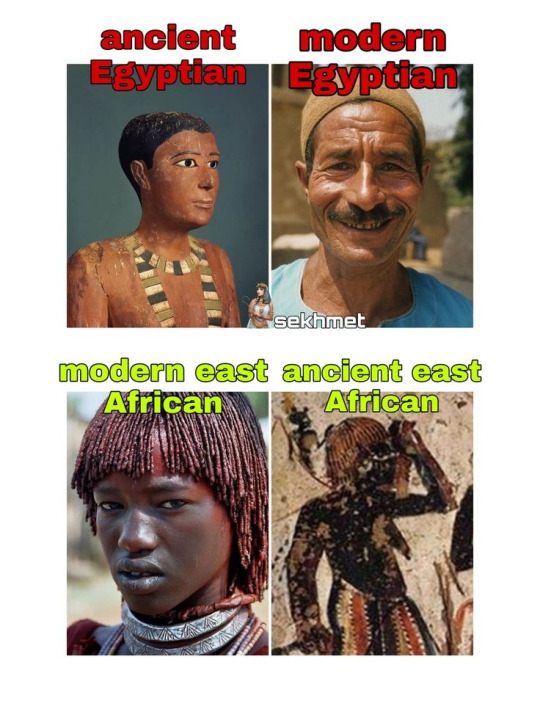
References:
McComiskey, Bruce. “Visual Rhetoric and the New Public Discourse.” JAC, vol. 24, no. 1, 2004, pp. 187–206. JSTOR, http://www.jstor.org/stable/20866617. Accessed 27 Jan. 2024.
0 notes
Text
Misrepresentations of Egypt(ians) in the Media
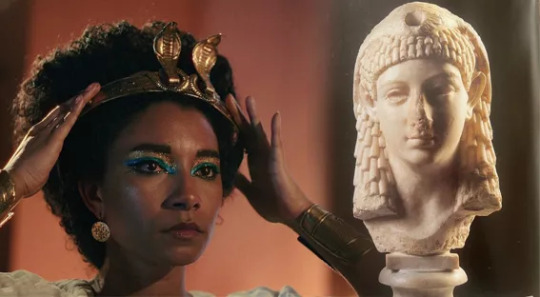
Adele James playing Cleopatra in Netflix's Cleopatra (2022), vs. a statue of Queen Cleopatra.
Afrocentrist narratives misrepresent Egypt and Egyptians in Pop-Culture despite ample scientific and historical evidence that prove those narratives wrong.
This blog attempts to investigate the mechanisms and agendas of how Afrocentrist narratives and relevant ethnic and racial misrepresentation of Ancient Egyptians manifest in the various forms of multimodal digital media and pop-culture, from an Egyptian perspective. It also aims to delineate the repercussions of Afrocentrism on the history and heritage of both: Egypt and Sub-Saharan African nations, mainly to prove that Afrocentrism only ensures the spread of racist hate speech towards Northern Africans whose skin is not black rather than celebrate the greatness of the long shunned Sub-Saharan African heritage. Afrocentrism should be about reviving the tribal heritage the Black peoples of Africa instead of claiming credit for other nations’ history. This paper will basically criticize the pseudohistorical Afrocentric narrative that is advertised in Pop-Culture, official museum displays of defaced replica of Ancient Egyptian statues to have Sub-Saharan features, as well as theatrical and cinematic normalization of the image of Ancient Egyptians played by Black actors. The results of the ongoing Afrocentric (social) media campaign can only fuel socio- and geopolitical conflict among the peoples of Africa as well as further bury the Sub-Saharan precolonial heritage by only focusing on falsely proving their ownership of Ancient Egyptian accomplishments.
Since the 1970s, Afrocentricity/Afrocentrism has been around, defying logic, history, and science. Yet, somehow this culturally-appropriating narrative has found its way out of the founding academic papers into a lot of recent media productions such as: Netflix’s 2023 ‘documentary’ “Cleopatra” in which the Macedonian-Egyptian Queen and other Egyptian characters are portrayed Black, to which Egyptians reacted in a social media campaign to defend the attempt to blackwash their history through falsifying information that definitely arise from an agenda. This Afrocentric belief is advertised by celebrities, like Michael Jackson in his music video “Remember the Time” in the 1970s; Beyoncé and Rihanna who portrayed Queen Nefertiti in a Dutch museum and on Vogue cover respectively (Yee), in 2023; as well as Kevin Hart who supported a group of animators on the TV program “Shark Tank”, granting the team Black Sands Entertainment around $500,000 to promote Afrocentrism through Anime and Comics, resulting in an online backlash from Egyptians under the hashtag #CancelKevinHartShow that led to taking down his stand-up comedy show that was scheduled to take place in February – also in 2023 (Nowar). It is worth mentioning that the academic world as well is still actively pushing for Afrocentric ideology, as a group of African American professors had planned the One Africa Conference in February 2022 to take place in Aswan, and the Egyptians reacted with the hashtag #stopafrocentricconference, and it was indeed taken down (Aidi).
Hence, the movement is currently celebrated by a lot of Black people, especially African Americans, who engage in online campaigns, supporting the spread of the false Afrocentric beliefs promoted in popular media, especially in the last couple of years. In resistance, the Egyptians are launching awareness campaigns and resisting any potential promotion of the Afrocentric theory, counter-arguing with factual evidence. The author of this paper is just one more Egyptian who is adding to the corpus of Anti-Afrocentric dialogue in an attempt to academically refute the Afrocentric allegations against the Egyptians as the rightful heirs to their ancestor’s legacy, highlighting the jeopardies of falsifying history for both, Sub-Saharan and Egyptian heritages, as well as the underlying malicious agendas fueling the Afrocentric racist discourse.
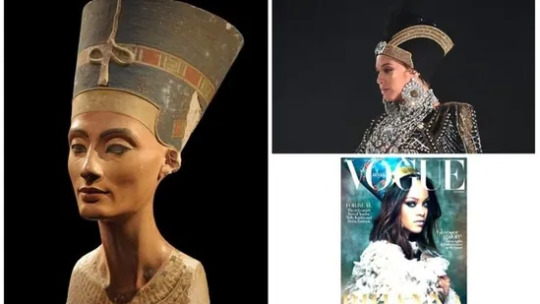
An exhibition in a Dutch museum that depicts black American singers, entertainers, and artists like Beyonce and Rihanna as the pharaohs of ancient Egypt has sparked a cultural conflict.(Wikimedia Commons/Twitter)

"Remember the Time" by Michael Jackson, behind the scenes.
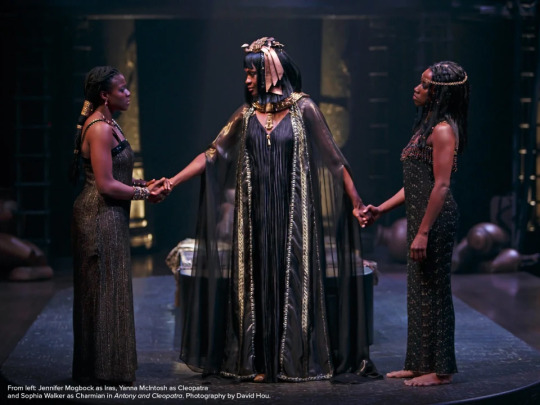
Anthony and Cleopatra, Stanford Festival (2015), directed by Barry Avrich.
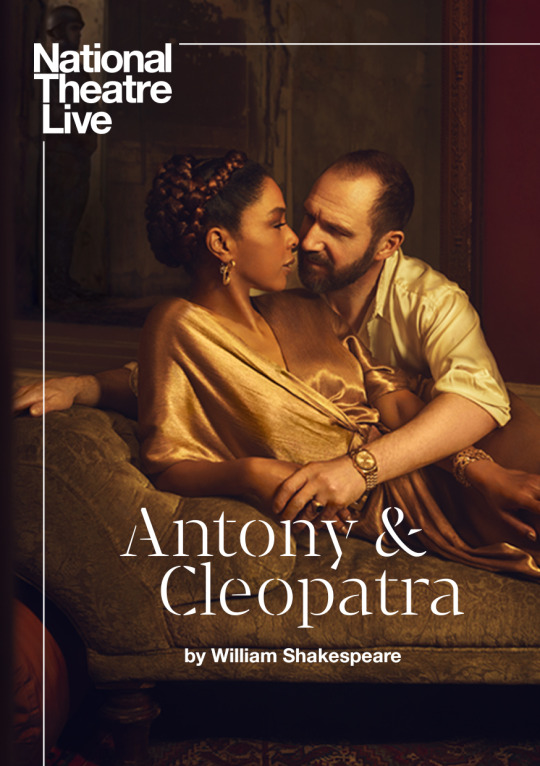
Ralph Fiennes and Sophie Okonedo (black actress, obviously) play Shakespeare’s famous fated couple in his great tragedy of politics, passion and power. Directed by Simon Godwin (Romeo & Juliet, Hansard).
Data Collection/Analysis Methods
Since this research is focused on analyzing the misrepresentations of Ancient Egyptian heritage in pop-culture, particularly social media posts and media productions, the primary resources would be materials collected from Facebook, Twitter, Instagram, Tiktok, as well as some media productions, like the abovementioned works. Also, less popular productions, like Anthony and Cleopatra which presented by The National Theatre of Britain in 2018 in which all the Egyptian character, including Cleopatra, were portrayed by black actors. Some secondary resources would include newspaper reports and social media conflicts. To illustrate, Netflix’s mini-series “Cleopatra” (2023) received its fair share of criticism until its genre was officially changed from ‘documentary’ to ‘fictionalized’ story, with some Egyptian lawyers suing Netflix for the falsification of history, while the mini-series received a terribly low rate on IMDB and other platforms. Meanwhile, Afrocentrics were reactive on social media, defending their beliefs and cheering for the latest Cleopatra, supporting their argument with nothing more than photos from their trips to Egypt, posing with the monuments, and writing captions that explicitly denote that they are “back home”, following the steps of famous celebrities who also do this. In another backlash, Egyptians started spreading cultural awareness about the Egyptian identity in an unprecedented enthusiasm to promote a stronger sense of identity and educate their social circles about the dangers of the Afrocentric beliefs and the importance of standing up for our culture on (social) media. All of these social media interactions can serve as a well of resources to study the phenomenon in question.
P.S. A random social media user once commented: "Egyptians can't have been black. They used black eyeliner and it was easy to see, unlike the actress who had to put a ton of golden glitter and blue outline for the outliner to be that visible!"
References
Agnihotri, Akanksha. “Dutch Museum’s Beyonce Exhibit Sparks Controversy in Egypt.” Hindustan Times, 21 July 2023, www.hindustantimes.com/lifestyle/art-culture/dutch-museums-beyonce-exhibit-sparks-controversy-in-egypt-101689926841925.html.
“Antony & Cleopatra.” National Theatre at Home, www.ntathome.com/antony-and-cleopatra. Accessed 16 Feb. 2024.
Aidi, Hisham. “Egypt and the Afrocentrists: The Latest Round.” Africa Is a Country, 2022, africasacountry.com/2022/03/egypt-and-the-afrocentrists-the-latest-round#:~:text=By%20mid%2DFebruary%2C%20the%20One,of%20an%20abiding%20Arab%20racism.
Nowar, Mariam. “Kevin Hart and Afrocentrism: Why Some Want His Show Cancelled in Egypt.” El-Shai, 13 Dec. 2022, www.el-shai.com/kevin-hart-and-afrocentrism-why-some-want-his-show-cancelled-in-egypt/.
Yee, Vivian. “Black Artists Embrace Ancient Egypt. Egyptians Aren’t Happy about It.” The New York Times, The New York Times, 18 June 2023, www.nytimes.com/2023/06/18/world/middleeast/egypt-african-dutch-museum.html.
"Stratford Festival: Antony and Cleopatra." IMDb, IMDb.com, 4 Sept. 2016, www.imdb.com/title/tt4144932/.
3 notes
·
View notes
Text
When I first learned about Afrocentrism in 2021, I wrote this (along with my photo in Egyptian eyeliner)
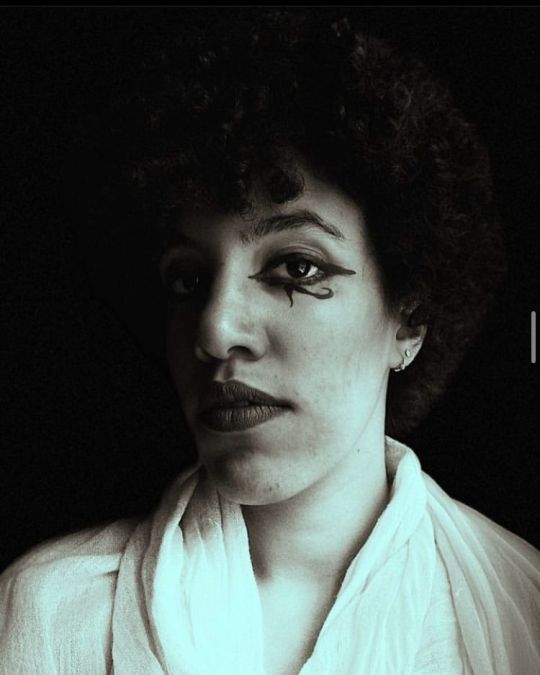
Your local Egyptian Queen is sick of Ancient Egyptian cultural appropriation and decided to write a long-ass post in elaboration.
For years now, *non-Egyptian* people, mostly black people, have been claiming that Egypt is originally black, and that happened in a personal encounter in the States where a black Henna artist was saying that Henna was first made in Egypt by native black Egyptians. Not that Egyptians are not dark-skinned, but we are not black as a RACE. Our race just happens to have a variety of colors ranging from very fair to very dark.
Also, famous celebrities, including Beyoncé, Naomi Campbell, Lil Nas, Micheal Jackson, (and other white ones as well like Katy Perry), and even on the national theater of Britain where Shakespeare’s Anthony and Cleopatra had the worst casting ever with Cleopatra and all the Egyptians and Egyptian settings were Black-washed (we can’t also forget the classic White-washed Cleopatra acted by Elizabeth Taylor). And the list goes on.
Not to mention the fact the digital reconstructions of mummies as black people (not Middle-Eastern caucasians like we actually are), the claims that some major Middle-Eastern prophets were black, that the Moors of Andalusia were black, and even some great universities like Oxford are promoting such an ideology, which we call Black-Centrism (more broadly Afro-Centrism).
Why is this a major problem? Because the notion of Make-Egypt-Black-Again implies that the culture, the land, the water even, is not ours and that we, current Egyptians, are actually colonizers. Does that ring a bell? The right of return for instance in our neighboring Palestine?
What can we do about this as Egyptians? We have to learn our history and culture to be able to refute such lies, and if we happen to know a non-Egyptian, it would be great to educate them in case they started sharing such content.
The Black-guilt-ridden claims are all on the colonizing white world. We have nothing to be guilty about concerning our Black neighbors, but now anybody who participated in spreading such a hoax does owe us an apology.
References Photo of author wearing winged eyeliner, Ancient Egyptian style. 29 June 2021. Cairo, Egypt.
0 notes
Text
Ethnicity of Egyptians
When you're the first established civilization, you sure attract a lot of visitors who want to settle and have lunch with the cool guys, aka Ancient Egyptians. Fast forward 7000 years, you think we all look alike or take from ONE genetic pool?
I am a humanities researcher, not an anthropology one, so below are some helpful references that are based on scientific, historic, and anthropological studies for interested readers, and as an evidence to back up my original research with facts. But I am not here to get in a debate about the origins of my ethnicity, race, or heritage; I am more focused on studying the way this topic is dealt with from a humanities point of view, especially that such a topic is an almost all virtual debate in its entirety.
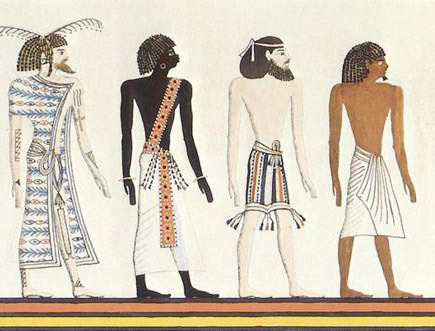
The Ancient Egyptian classification of ancient peoples (from left to right): a Libyan, a Nubian, an Asiatic, and an Egyptian. Drawing by an unknown artist after a mural of the tomb of Seti I; Copy by Heinrich Menu von Minutoli (1820). In terms of skin colour, the Libyan has the lightest complexion, followed by the Asiatic who is yellowish in appearance. The Egyptian is reddish-brown, while the Nubian is black. Each group is also marked with their own distinctive hairstyles and clothing. The representation of ethnic groups in Egyptian iconography has been a source of dispute among scholars.
References:
“Egyptian Race.” Mathilda’s Anthropology Blog., 9 Nov. 2009, mathildasanthropologyblog.wordpress.com/tag/egyptian-race/.
Hays, Jeffrey. “Minorities, Foreigners, Ethnicity and Diversity in Ancient Egypt.” Facts and Details, Sept. 2018, factsanddetails.com/world/cat56/sub365/entry-6133.html.
Team, ETP. “The Race of Ancient Egyptians.” Egypt Tours Portal, Egypt Tours Portal, 11 Oct. 2023, www.egypttoursportal.com/race-of-ancient-egyptians/.
2 notes
·
View notes
Text
What makes you an Egyptian?


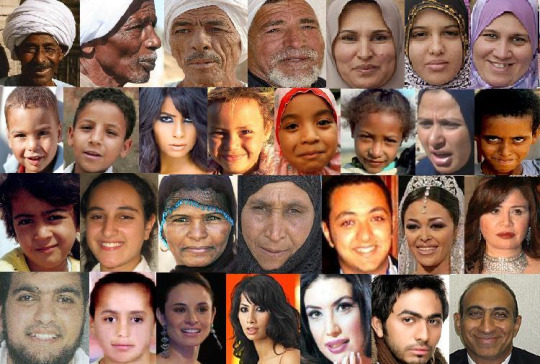
As an Egyptian, I can tell whether someone is Egyptian by just looking at them. It's like a built-in radar! But if you ask me what we look like? Hard to answer. We have people with olive skin, white skin, black skin -- brown, green, and blue eyes -- curly, wavy, and straight hair -- and all possible combinations of features, and most importantly, spirit.
We are not discriminatory or colorblind; we are just a normal people, there are racists and non-racists, equally.
But we simply believe if you are born and raised in Egypt, or you're born elsewhere and choose to live in it and respect its traditions and values, you're Egyptian already.
An interesting article about how Afrocentrism actually has bred a surge in awareness about inclusion through digital media is attached in the references.
"This question of what makes people who they are is extremely complicated, and there is no clear answer, but what is clear is that there are myriad factors contributing to identity in general, and especially Egyptian identity. There is no doubt that a country with such a rich history and culture cannot be defined by a single era, even if it is the most defining one to some non-Egyptians who are unaware of the rest of Egypt’s diverse history" (Auf).
Reference:
Auf, Omar. “‘Egypt for Egyptians’ Raised Awareness, Now It Must Encourage Inclusion.” Egyptian Streets, 4 May 2023, egyptianstreets.com/2023/05/04/egypt-for-egyptians-raised-awareness-now-it-must-encourage-inclusion/.
0 notes
Text
"Genes go back to the 7th Ancestor"
In Egypt, we have a saying that goes like: "genes go back to the 7th ancestor", which is visualized in the photos below of modern Egyptians and their lookalikes from ancestors thousands of years ago. No DNA test needed! Or if you still need one, check the article at the end of the post!
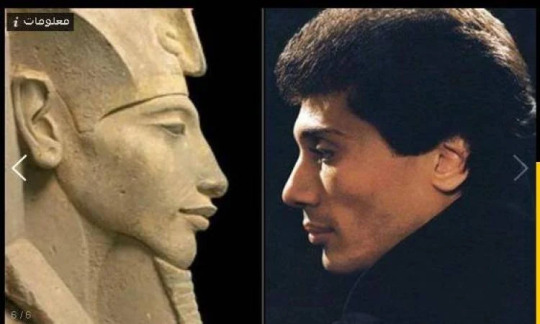
Statue of Egyptian King Akhenaten | Egyptian Artist: Aly Al-Haggar (1954-)
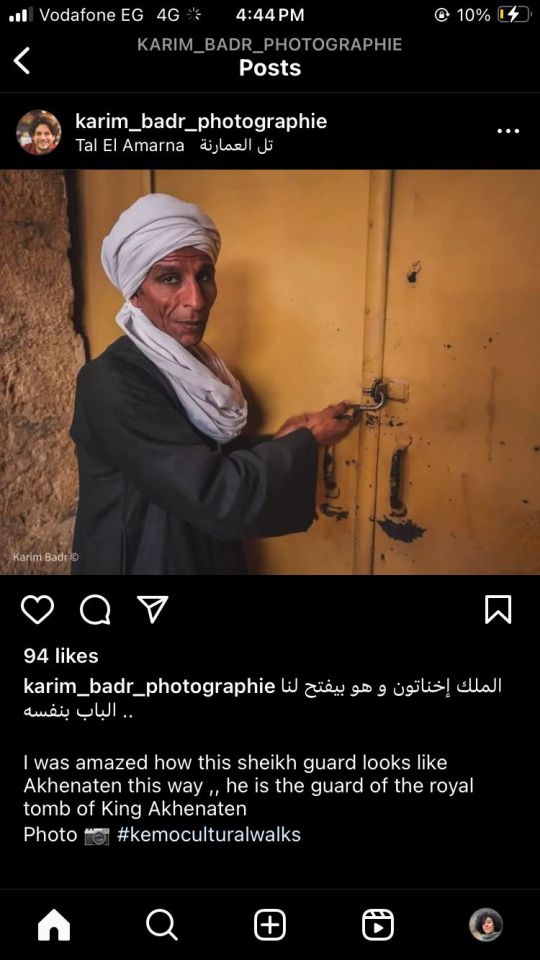
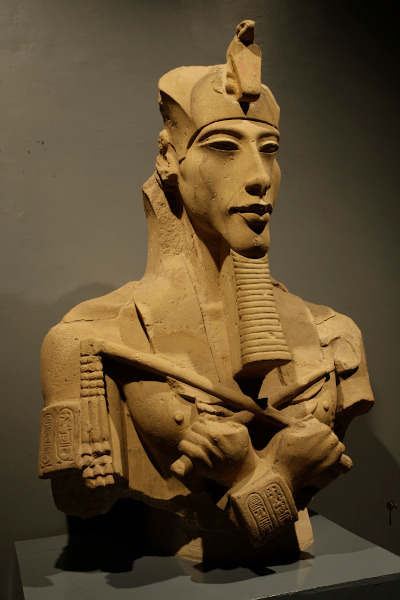
Kamaal, current guardian of the tomb of Akhenaten, bears uncanny similarity to Akhenaten, as if he is his own reincarnation. His photo went viral on social media recently (March, 2024).
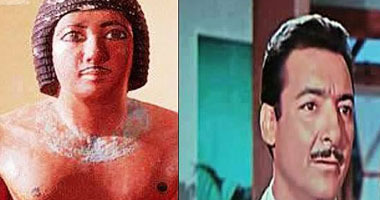
Statue of the Egyptian Scribe Ka-Irw-Khufu (more information in the references below) | Egyptian Actor: Rushdi Abaza (1962-1980)
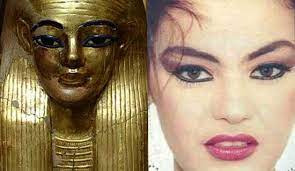
Death Mask of Yuya (now in the Egyptian Museum) | Egyptian Actress: Sherihan (1964-)
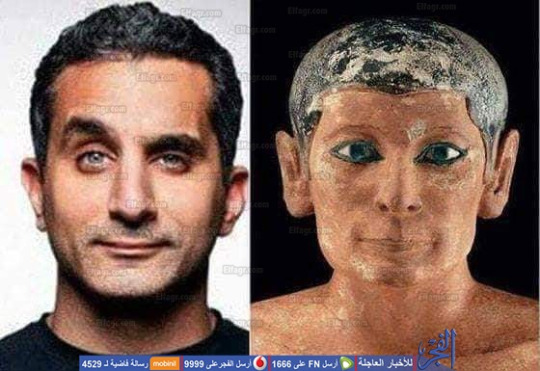
Egyptian-American Celebrity: Bassem Youssef (1974-) | Statue of The Seated Scribe (4th or 5th Dynasty of Egypt, c. 2600 - 2350 BCE, from Saqqara, on display in the Louvre, Paris.)
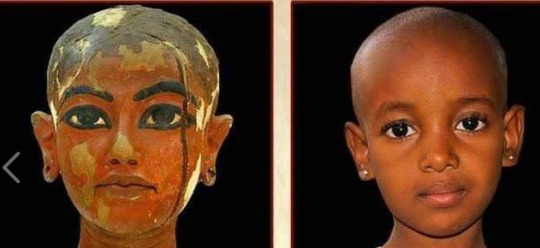
Statue of Tutankhamun in his childhood | Modern Egyptian Child from Aswan

Statue of Vizier Sennefer (more information below) | Egyptian Actor: Khaled El-Nabawy (1966-)
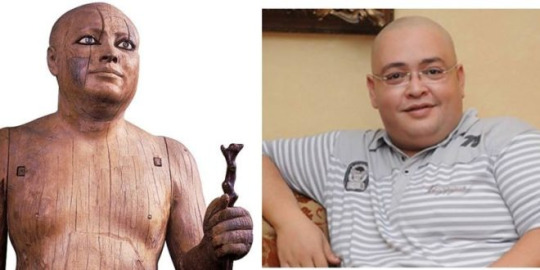
Ancient Egyptian wooden statue of the Priest Kaaper (Sheikh-El-Balad who has an interesting story. Link in the references below.) | Egyptian Actor: Ahmed Rizq (1976-)


And everyone's absolute favorite, Egyptian Actress Sawsan Badr (1957-), doppelganger of Queen Nefertiti.
But Afrocentrists be like:
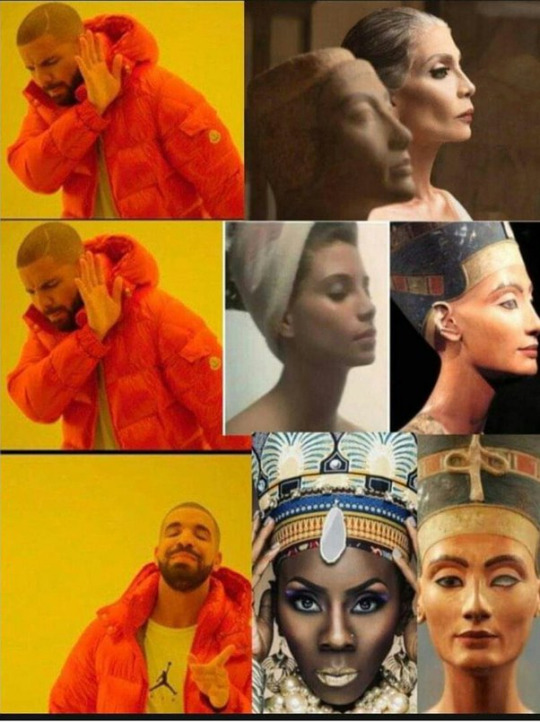
References:
Death Mask of Yuya. Egyptian Museum, https://en.wikipedia.org/wiki/Yuya#/media/File:Mummy_mask_of_Yuya.jpg.
“Egyptian Woman Traces Her DNA to Ancient Mummy from Saite Dynasty.” Egypt Independent, 16 May 2023, egyptindependent.com/egyptian-woman-traces-her-dna-to-ancient-mummy-from-saite-dynasty/.
Egypt Museum. “Colossal Statue of Akhenaten.” Egypt Museum, 23 Nov. 2023, egypt-museum.com/colossal-statue-of-akhenaten/.
“Statue of Ka-Aper.” Discover Egypt’s Monuments - Ministry of Tourism and Antiquities, egymonuments.gov.eg/collections/statue-of-ka-aper-2/. Accessed 16 Feb. 2024.
The Seated Scribe, Ka-Irw-Khufu, found in August of 1957 in his tomb at Giza. Photographed at the Cairo Museum in November of 1963. | Located in: Egyptian Museum, Cairo. --- Image by © Roger Wood/CORBIS
The Seated Scribe. World History, 4th or 5th Dynasty of Egypt, c. 2600 - 2350 BCE, from Saqqara, on Display in the Louvre, Paris., https://www.worldhistory.org/image/5858/the-seated-scribe/.
Vizier Sennefer, detail from sculptural group depicting Sennefer with his wife Hatshepsut, painted stoneware, 68x85 cm. New Kingdom, 18th Dynasty. Now at the Louvre.
XBP341818 Head of the child king emerging from a lotus flower, from the Tomb of Tutankhamun (c.1370-1352 BC) New Kingdom (stuccoed & painted wood) (see also 149406) by Egyptian 18th Dynasty (c.1567-1320 BC); Egyptian National Museum, Cairo, Egypt; (add.info.: size of a new-born child; found at entrance of the tomb; ); Photo eBoltin Picture Library; Egyptian, out of copyright Media ID 22679652 © Boltin Picture Library / Bridgeman Images.
2 notes
·
View notes
Text
Blackwashing is also cultural appropriation
Anecdote
A couple of months ago, I welcomed my professor from Duke University who came with some freshmen. It was super fun taking a group of youthful students around the streets of Cairo, showing them around in a Summer evening until this young Black lady said, “I was so glad I saw the Egyptian mummies. They look exactly like me!” And that’s when I decided to cut the whole tour short, recommend a nice restaurant, and leave. Had I commented on that statement, it would’ve ended in a debate that I wasn’t ready to start with a tourist who’s staying for a couple of days, and it’s in my genes and tradition to show hospitality to strangers, especially when they aren’t aware of the offensiveness of their words. Not only did she offend my heritage, country, history, and ancestors — in her very brief statement she called me a colonizer, and she’s not a random, uneducated American: she’s a Duke student, and she blindly believes in Afrocentrism.
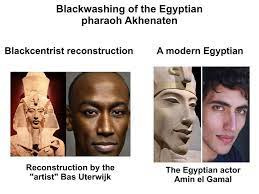

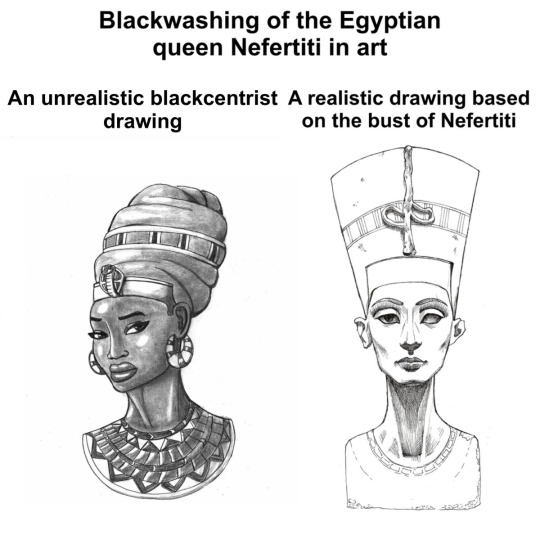
Afrocentrism is a form of cultural colonization and aggression against Egyptian heritage. The whole belief is fallacious and may sound like a poor, fictional recounting of an alternative history, but it is proving itself a real hazard, as is not only practiced by a group of random conspiracy theorists, rather by institutions that keep spreading the ideology and beliefs of Afrocentrism like cancer, in what is referred to as ‘Blackwashing’, through grand media productions, celebrity talks, and lately — quite explicitly — through so-called “documentaries” like Netflix’s Cleopatra funded by Jada Smith. Afrocentrism is an attempt to manipulate history to glorify the tribal history of Black people to claim ownership of the grandiose history of the greatest civilization in human history, the ancient Egyptian kingdom with its thirty dynasties, religions, scientific advancements, and world wonders that are not yet comprehensible to modern people that they started giving extra-terrestrial creatures credit for — with complete disregard to the actual truths based on existing artifacts, mummified bodies from a couple of millenia, linguistic traces, and many more cultural aspects inherited by over a hundred-million people, AKA modern Egyptians. These unjust practices even include building statues and forging images of Ancient Egyptian monuments into having Sub-Saharan features and displaying them at the Metropolitan Museum in NYC as well as the British Museum (besides all the stolen artifacts), feeding the AI with such alterations that keep producing more and more art with false features of Egyptians portrayed as Sub-Saharans, and manipulating the minds of unaware Internet-users into believing that his is the truth.
Race is a modern American obsession inherited from the white colonizers’ superiority complex, which led every different race to feel the need to prove their worth in the modern melting pot of the US — which is something that Egyptians have never had. “Afrocentrism began with powerful claims concerning the rise of Ethiopia, the emancipation of the Israelites, the race of Ancient Egyptians, Jesusand the inventors of science and mathematics” (Balakrishnan), yet this only shows how they chose the wrong enemy to bash against. Egypt is the oldest melting pot of cultures with the longest recorded history of the rise and fall of kingdoms in its land. The Sphinx has witnessed the glory of the Greeks when they ruled Egypt, built their temples, and altered the written language; the arrival of the Romans with their brutalism and tyranny; the exodus of Moses and his followers; Virgin Mary with baby Jesus taking shelter in Sinai, Cairo, and the south of Egypt; the Arab conquests with their language and beliefs; the Napoleonic wars; the Crusaders; the British colonization; the Muslim Shia establishment transforming into the greatest center for studying Sunni Islam; the Ottoman Empire; the World Wars that sent European refugees to the lands of Egypt; the wars on the border with the Zionist, terrorist state of Israel; the terrorist organization of ISIS (who had the audacity to take the name of the greatest goddess in the Ancient Egyptian pantheon as an acronym for their evil group); welcoming Palestinian, Syrian, and Sudanese refugees. The Egyptian history is rife with a variety of races and cultures and religions whose people settled and mingled with Egyptians, thus race is not something that Egyptians have really had to care about throughout their history. Therefore, Egyptians are mainly North African caucasians with a long history of mixing with foreign genes from all over the world, unlike the closed, tribal societies that the Sub-Saharan Africans have lived in for thousands of years, preserving their genes, and only realizing that there are “white” people when such people came to enslave them.
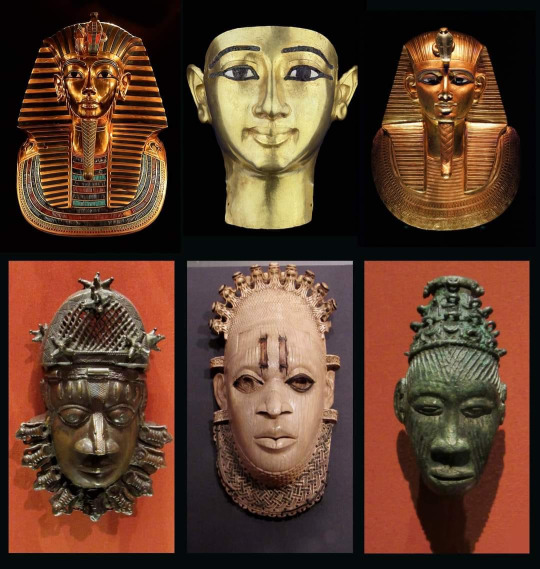
The history of Sub-Saharan Africa is full of amazing culture that should’ve been the focus of the Afrocentric movement: to revive such a history and tell the tales of their heroes and folklore tales. The focus of the Afrocentric ideology on claiming Ancient Egypt as their home makes their own rich heritage sink more into the shadows of history and get buried in the golden soil of their lands. “Afrocentrism encourages black Americans to discard their recent history, with its inescapable white presence, and to embrace instead an empowering vision of their African (specifically Egyptian) ancestors as the source of western civilization” (Walker). Rather than the victim mentality and fictional-historicism that Afrocentrism adopts, it should celebrate the racial diversity and resilience of Africans in the face of time and colonizing conquests, and take pride in all shades of Africans, instead of trying to claim the history of Egyptians as their own and initiate an uncalled-for hostility between the north and the rest of the continent.
This topic is researchable due to the myriad of studies on Afrocentrism, as well as media and cultural productions, Internet movements, and historical forgery. The Afrocentric productions and beliefs can be easily compared to actual Egyptian and Sub-Saharan history, which proves the false basis of this hypothesis. I find this research topic of great importance because it is all built on a false, delusional, and politicized historical claims, falsifying both — the Egyptian and Sub-Saharan identities, rewriting history to frame modern Egyptians as white colonizers (even though they have been, ironically, colonized since the rise of the Greek Empire till the 1950s). Even though the whole argument is hollow, somehow the media is supporting it and making an effort to make it replace the true history. Potential research design and method(s) of investigation include: historical, evaluation, ethnological, and cultural analysis. The most applicable research method, in my opinion, is critical realism.
References:
"Afrocentrism." Britannica Academic, Encyclopædia Britannica, 23 Jul. 2020. academic-eb-com.ezproxy1.lib.asu.edu/levels/collegiate/article/Afrocentrism/343557. Accessed 30 Aug. 2023.
Walker, Clarence E.. We Can't Go Home Again : An Argument About Afrocentrism, Oxford University Press, 1989. ProQuest Ebook Central, https://ebookcentral-proquest-com.ezproxy1.lib.asu.edu/lib/asulib-ebooks/detail.action?docID=273369.
Balakrishnan, Sarah, (2020) “Afrocentrism Revisited: Africa in the Philosophy of Black Nationalism”, Souls, 22:1, 71-88, DOI: 10.1080/10999949.2019.1711566
0 notes
Text
When it dawned on me...
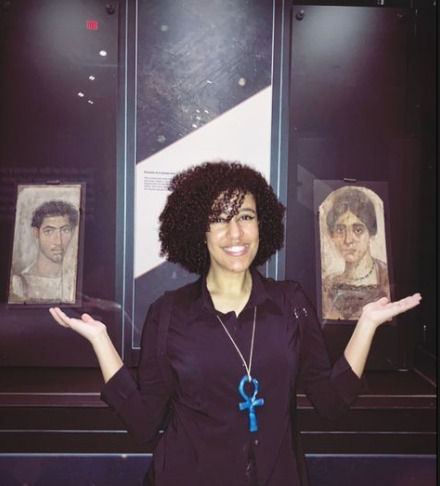
Meeting the Fayoum golden mummy portraits that I adored from my middle school history book for the first time on their exhibition tour in North Carolina Museum of Art.
I spent a good part of the COVID era (2020-2021) in the US on a Fulbright scholarship. I was lucky to catch the golden mummies on tour in North Carolina where I was based, so I dressed up in my biggest key-of-life (ankh) and an elaborate winged eyeliner of my Egyptian ancestors to meet them. You can tell from my smile, as we say "from ear to ear", how excited I was to finally meet these folks. I am from Cairo and I have been all around Egypt, so the sight of an Egyptian monument of historical piece is nothing but ordinary, however it hit different to visit this exhibition on a different continent, and to see these portraits from Roman Egypt.
At that time, I did not know there was something such as "Afrocentrism", but I did see glimpses of that malignant theory during my stay in the US. I was once touring the French Quarter in New Orleans, Louisiana, with an Egyptian friend, when we stopped to watch a Black Henna artist whose art was just beautiful. She asked if we were Egyptians, and when we said we were, she said "do you know that ancient Egyptians were black?" and we did not understand how she would get that weird idea, but later on we found out about this Zionist approach of blackwashing the Egyptian history. Maybe that Henna lady did not mean anything wrong, and she really believed what she was saying -- which is an even bigger problem!
I've read once a post by an Egyptian mother living in Canada who wrote about how unsafe she felt for her children. There was a school event where students had to wear something that represented their culture, and she noticed Black parents commenting on her child's Ancient Egyptian costume as "celebrating Black ancestors". She feared for the misinformation and appropriation her child has to go through in the Canadian education system, and even for his safety as an Egyptian defending his history and heritage, being "called a descendant of a white colonizer" when it is completely false.
Having realized the huge impact of Afrocentrism on people, and the way it is spreading like wildfire on the internet, I've decided to write this blog on the subject.
This blog is arranged to be read from newest-to-oldest. Happy scrolling!
References: Photo of author posing with two of the Fayum mummy portraits on exhibition. 28 Mar. 2021. North Carolina Museum of Art.
1 note
·
View note
Text
2023: Social Media and Afrocentrism
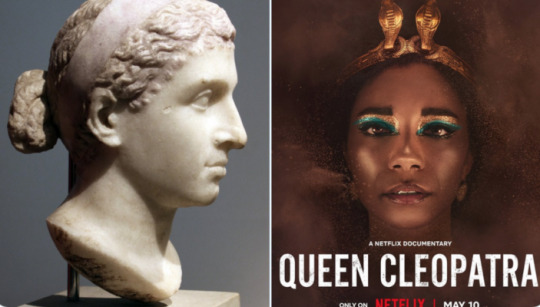
2023 has been a high year for Afrocentrism.
ElGendy writes, "The outrage marks the second such incident around the subject since February 2022, when the inaugural “One Africa: Returning to the Source” conference was set to take place in Aswan. In honor of Black History Month, the event — organized by the New York–based Akhet Tours and HAPI, an organization with a vision centered on Black people’s empowerment — proclaimed it would “unpack the historical connectivity and confluence of African people as they migrated throughout the continent.”"
With the attention this school of thought received after the release of Netflix's Cleopatra, Egyptians have become much more aware of the ideology and dangers of Afrocentrism, and decided to dedicate their social media presence to spreading awareness and educating one another on Afrocentrism, and resisting the agenda.
We began with a strong backlash towards Cleopatra's latest adaptation, even though it is NOT the first time she was portrayed by a black actress, but it was the first kind of adaptation that goes viral, especially that its producers claimed it to be a "documentary". Egyptians (and Greeks) forced IMDB to change the genre into "docudrama".
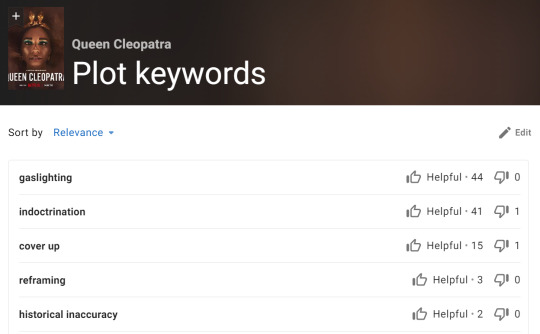
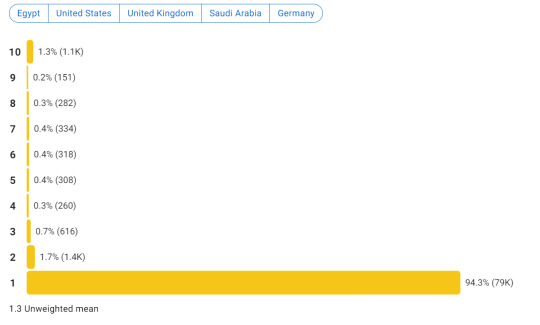
And because that was not enough, Kevin Hart was scheduled to give a standup show in Egypt. He used to be a dear to Egyptians who liked his sense of humor, but then after learning that he supports Afrocentrism, his show was cancelled after the viral hashtag "CancelKevinHartShow with the newly spread awareness on this kind of blackwashing ideology.
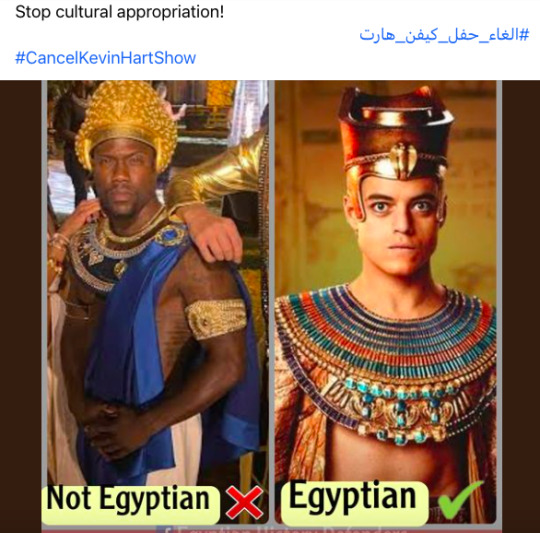

And to make matters even worse, the Metropolitan museum displayed an installation of an Egyptian temple with sphinx statues bearing Black features, which is an obvious defacing of the Egyptian Heritage. Ginsburg writes, "the faces found on four sphinxes that surround the central structure are portraits of the artist’s mother, cousin, brother, and life partner. The same goes for the faces found on the columns, which are representations of important people in Halsey’s life." However, it is “a distortion of history and a complete falsification” as Zahi Hawass, Egyptian archeologist, commented, adding “it is a shame that the museum, which is well-versed in the history of Egypt, allowed its trustees to carry out this farce,” he told Arab News, speaking for the rest of us (Shamaa).
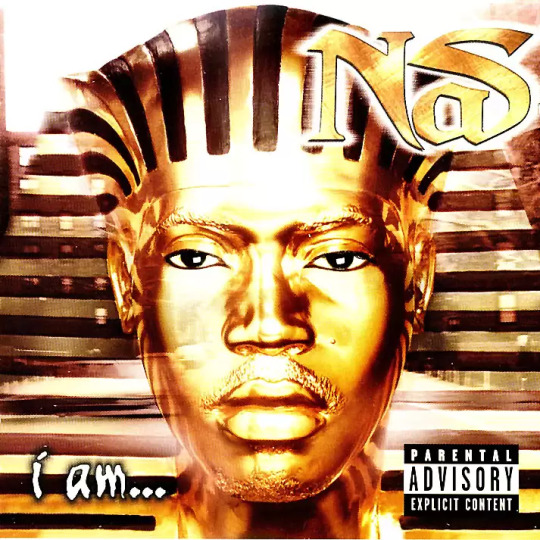
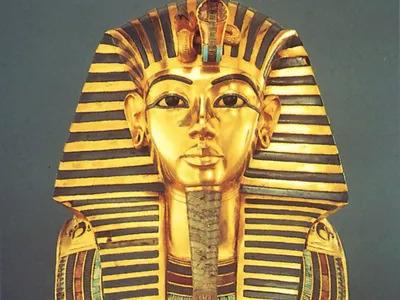
The golden death mask of Tutankhamun defaced with false black features versus the original Tutankhamun golden death mask.
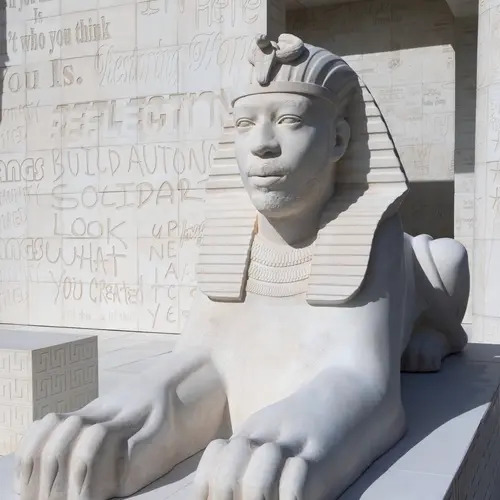
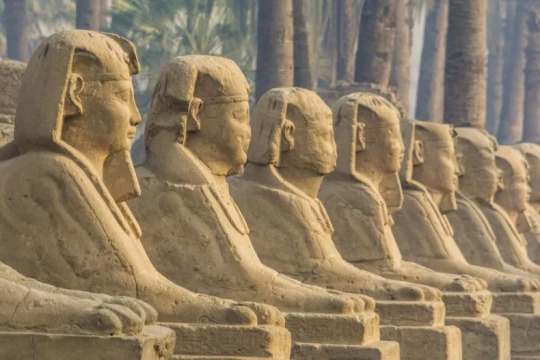
The MET installation versus Luxor's avenue of sphinxes is pictured.
References:
ElGendy, Abdelrahman. “Kevin Hart’s Tour in Cairo Sparks Debate on Afrocentrism and the Pharaohs.” New Lines Magazine, 30 Jan. 2023, newlinesmag.com/spotlight/kevin-harts-tour-in-cairo-sparks-debate-on-afrocentrism-and-the-pharaohs/.
Ginsburg, Aaron, et al. “Ancient Egypt and South Central L.A. Meet in Monumental Installation on the Met’s Roof.” 6sqft, 19 Apr. 2023, www.6sqft.com/met-roof-garden-commission-lauren-halsey/.
Shamaa, Mohammad. “US Exhibit of Sphinx with African Features Angers Egyptian Experts.” Arab News, 23 Sept. 2023, www.arabnews.com/node/2379256/middle-east.
0 notes
Text
Debate over Afrocentric production Cleopatra (2022) on Piers Morgan's show between Bassem Youssef and author Ernest Owens.
youtube
“‘They Are Stealing My Culture!’ Bassem Youssef on Netflix’s ‘Cleopatra’ Casting.” YouTube, Piers Morgan Uncensored, 24 Apr. 2023, www.youtube.com/watch?v=-qVKPyQ8lnc.
0 notes
Text
Afrocentrist Social Media activism
youtube
The tone of this creator is an example of how Afrocentrists' logic works: "there is no white race", "everybody originates from black people". Source? Trust me (or Asante or Diop or the five other Afrocentrist scientists). It is a cult built on very few scientific, provable, tangible evidence, and a lot of theorizing and, as the creator of this video puts it, "inferiority complex" -- projecting the core of his cult's beliefs. As the saying goes, every accusation is a confession when it comes to colonizers. You can't simply overcompensate for a culture you are not connected with by hijacking a culture that clearly belongs to the current indigenous people still living on that land, mixed with so many races that is, again according to the video make, a "social construct". The comment section is insanely brainwashed, and sort of pathetic as well.
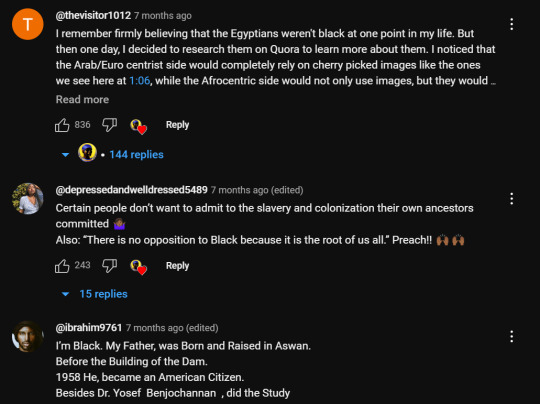


This is just a slight example from the comment section that I have seen under so many posts. Unfortunately, the debate is going nowhere, and people are there only to fight for what they believe for, regardless of which side they are on.
While on Instagram, I found this video with a lot of misinformation about the Great Sphinx of Giza, and this is a sample from the comment section:
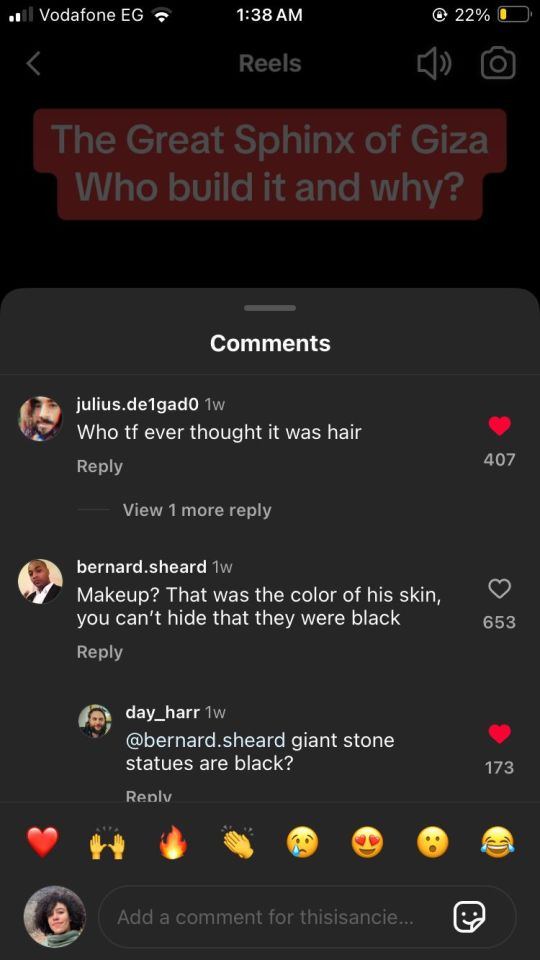
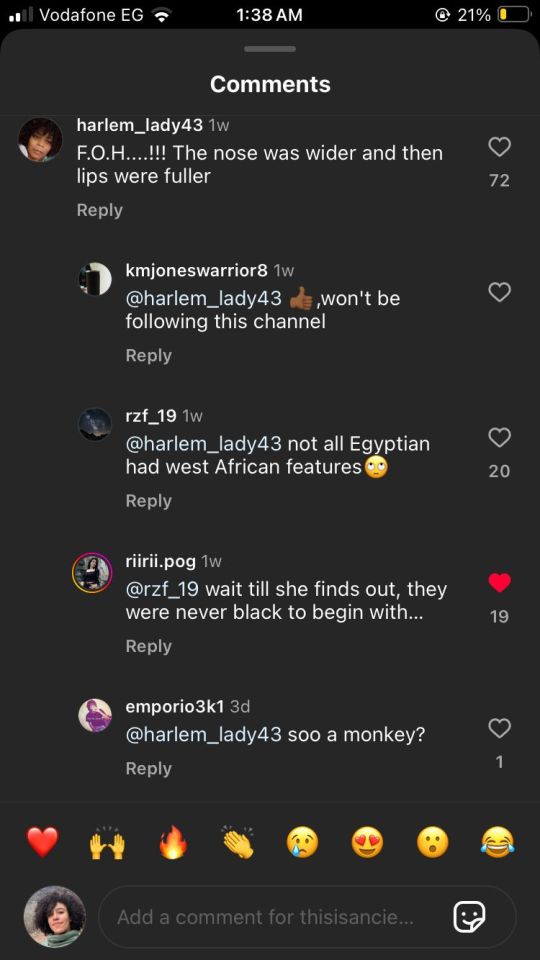
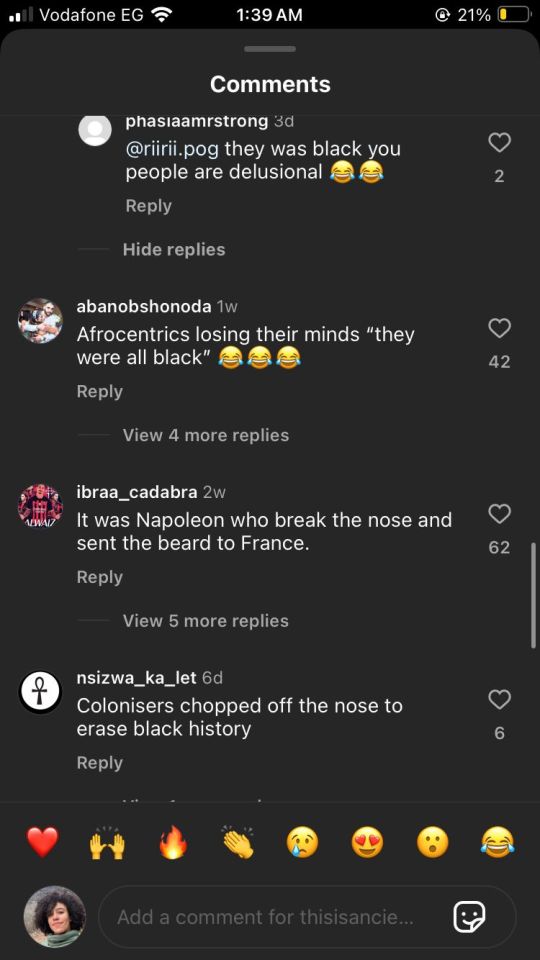
I just find it weird that we have to debate the obvious and to find ourselves as Egyptians in a position to constantly defend ourselves against the allegations of being "descendants of colonizers" for some nation's victimizing, make-belief ideas. Throughout its very long and well-documented history, Egypt has never been a colonizing nation, rather colonized -- a lot.
Reference:
“The Real Reason Egyptians Are Fighting Afrocentrists.” YouTube, Mr. Imhotep, 24 June 2023, youtu.be/1YZaJ1YjAlw.
0 notes
Text
Delulu Cannot be the Solulu
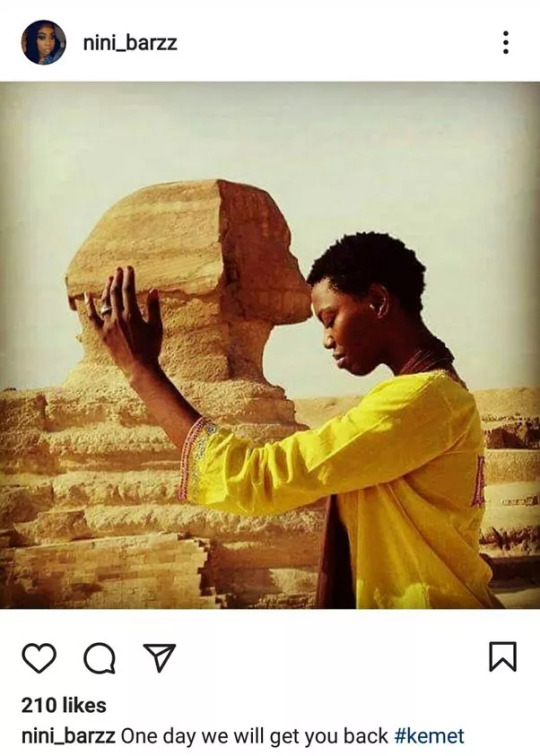
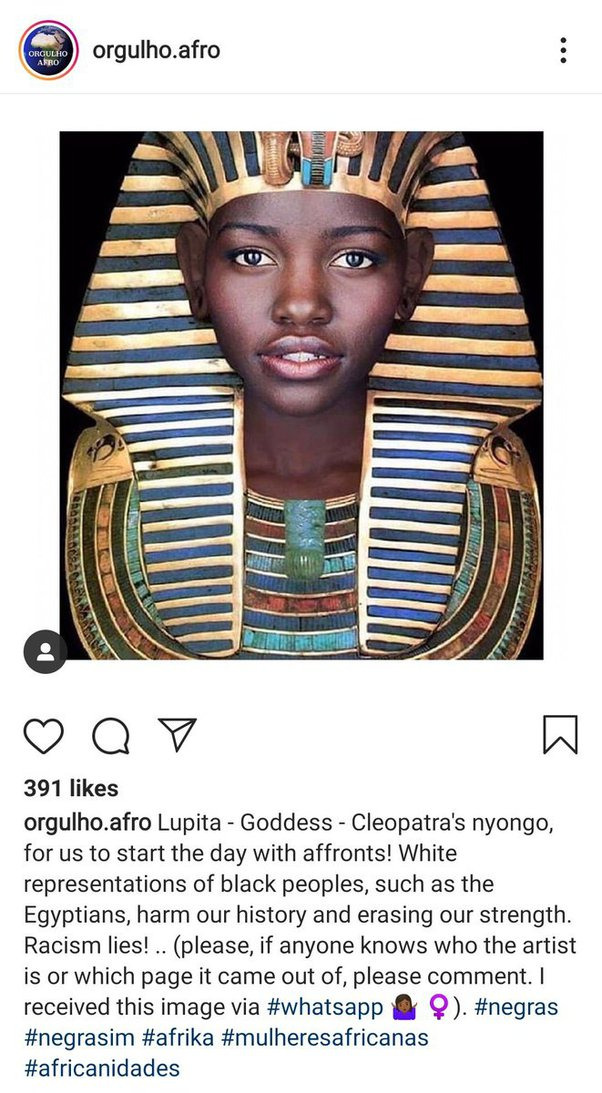

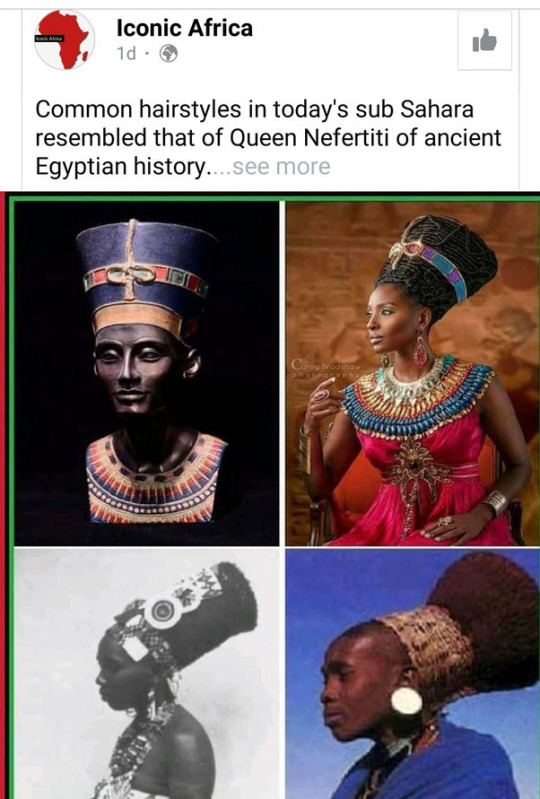
Umm, excuse me what?
Delusion (delulu) is never the solution (solulu), in internet jargon. Defacing existing statues, claiming that Nefertiti's headpiece was a HAIRSTYLE, putting men's regalia on women and saying this looks normal, and claiming to want the land BACK as if you had it ever?... This is pathetic, and culturally criminal towards both: Egyptian AND Sub-Saharan heritages. To each their own beauty, and both should be respected, however this is not what these lovely people are doing.
0 notes
Text
Hollywood sure knows how to cast actors for the role of an Egyptian, but some producers just feel like following the Afrocentric agenda (yikes!)
While a lot of Hollywood productions that feature Egypt(ians) are nothing but.. embarrassing, whether it was before or after the trend of Afrocentrism, as they were "played by non-Egyptians in bronze face" (Nour), like The Mummy (1999), Exodus: Gods and Kings (2014), and others.
Nour writes, "Actual Egyptians, and Arabs more broadly, usually performed the roles of a bumbling sideshow act in these movies: stealing treasures from ancient tombs or summoning evil spirits with the help of the occult; typifying the very worst stereotypes of Orientalist fantasy."
There is a not-very-fine line between cultural appropriation and appreciation, and this line needs to be drawn as bold as possible here.
There is definitely no shortage of Egyptians who can speak flawless English and have the talent to be starring Hollywood movies, a few of them would be: Oscar-winning Rami Malek, Omar Sharif, Mena Massoud, Rosaline Elbay, and May Calamawy (some of whom were actually casted in Egyptian roles). Yet, for some reason, Gal Gadot, an Israeli actress, was chosen to play Cleopatra --- and it is her in one production, or Adele James (black actress) in another. I mean, hello? Egyptians and Greeks are still here and would like to have a say in the representation of one of their most iconic historical figures?
I agree with Nour's argument when he writes that "the historical persona of Cleopatra is not some imaginary idea which can be re-created according to people’s whims and wishes. She is a Queen of Egyptian history and it is the right of the Egyptian people to have a say in her portrayal. As the son of Egyptians, who is proud of his eclectic heritage, his people and his culture, I say, boldly and defiantly: I am Cleopatra."
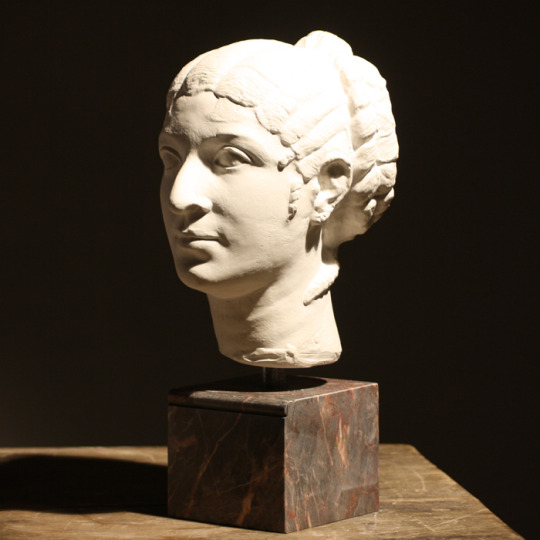
An ancient Roman bust, c. 50-30 BC, now held at The British Museum, depicting a woman from Ptolemaic Egypt, either Queen Cleopatra VII or a member of her entourage, during her 46-44 BC visit to Rome with her lover Julius Caesar. The bust is now located in the British Museum, London.
References: Nour, Daniel. “As Proud Egyptians, We Want a Say in Cleopatra’s Portrayal.” SBS Voices, 22 Oct. 2020, www.sbs.com.au/voices/article/as-proud-egyptians-we-want-a-say-in-cleopatras-portrayal/cc4y6uyzv.
0 notes
Text
Moon Knight and Scarlet Scarab -- A Silver/Gold Lining!


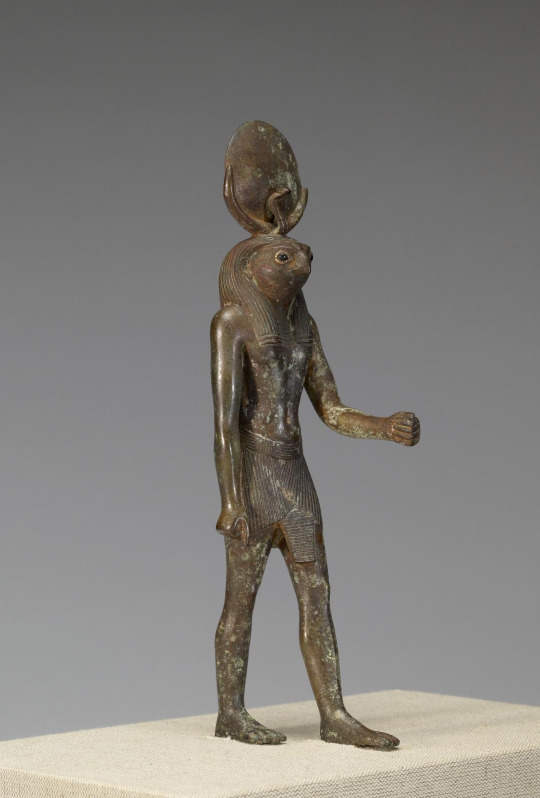
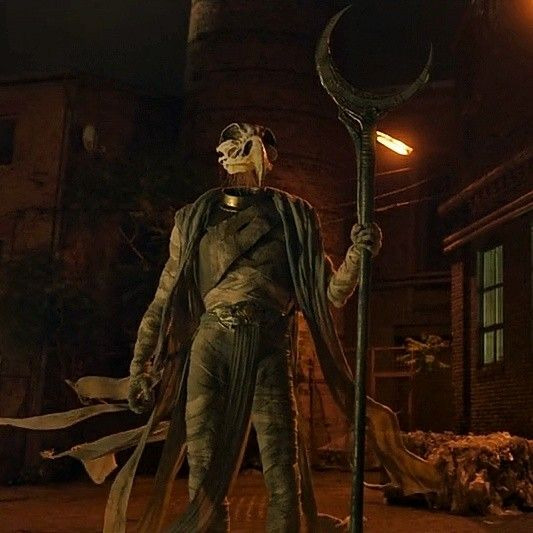

Not all Western representation of Egyptians are terrible. In fact, one of the most entertaining shows that are well-executed is Disney's Moon Knight (2022), adapted from Marvel comics with the same title. Starring Oscar Isaac, May Calamawy, and Ethan Hawke, directed by Mohamed Diab, the show became an instant favorite for Egyptians (if not everyone!). The team behind this show includes a lot of other Egyptians who all worked on getting the details right, from the casting to way actors dress and talk to the music and setting, and of course the mythology. This show, ironically, debuted around the same time the Afrocentric wave started. Coincidence?
References:
0 notes
Text
Afrocentrism in the American Education
youtube
As summarized in this video, Afrocentricity is a dangerous school of historigraphic thought, as it is now even becoming part of school curricula. How can such a theory be any good to teach? And how is it viable now to accept misinformation, history falsification, and cultural appropriation as part of school curricula?
A silver lining though is how people are reacting to this movement, and that, thanks to social media, we are able to have an open, global conversation about such an ideology. Below are screenshots from the comment section of the attached video.
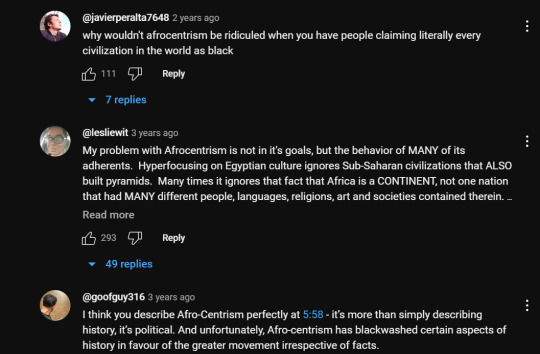

2 notes
·
View notes
Text
Afrocentrism // Zionism
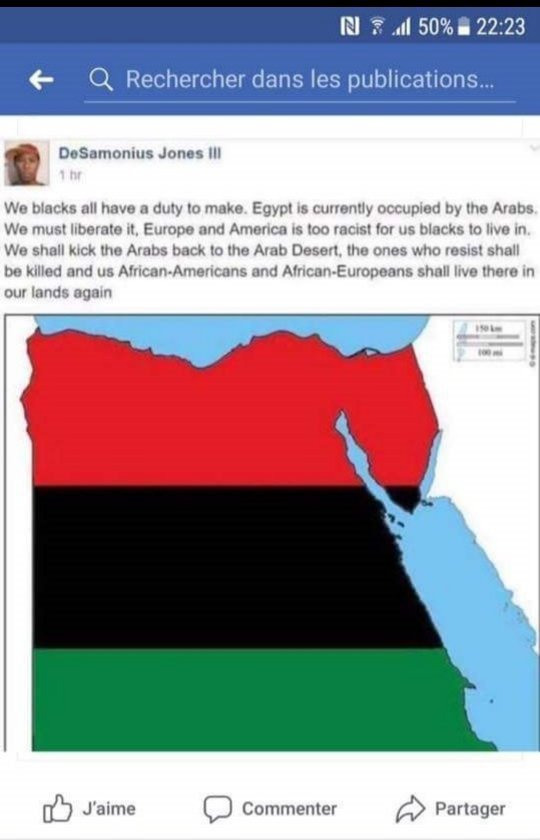
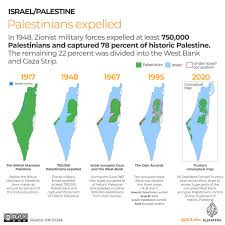
It is not a stretch to say that Afrocentrism is another Zionist project. The way the Zionist invasion of Israeli forces is trying to play the victim during the peak of their colonial aggression on Palestine is very similar to the way Afrocentrists are building their arguments.
Both are trying to gain sympathy due to their past in which their ancestors were victims of white colonizers, whether they were enslaved or displaced and burned and starved in the Holocaust.
The believers of both ideologies are trying to claim long ancestry to a land that they are not indigenous to, based on their own beliefs, with no actual evidence. Not only that, they also give themselves the right to dehumanize current Egyptians / Palestinians, accuse them of unreal crimes, falsify their history, and even want to "take their land back". The only difference is that the Israeli occupation is the same Afrocentric project, 100 years later.
In fact, Nadia Alahmed, a Dickinson College researcher, wrote a paper titled "From Black Zionism to Black Nasserism: W.E.B. Du Bois and the Foundations of Black Anti-Zionist Discourse" in which she discusses the vision of Du Bois and his understanding of Afrocentrism. Her conclusion goes as follows:
Du Bois and his vision and understanding of the dimensions of this discourse are invaluable because it is a microcosm of Black thought on the matter going back to the mid-late 19th century. As this article demonstrates, prominent Black nationalists of that era, such as Edward Wilmot Blyden and Martin Delany, saw Zionism as an example for growing their own successful immigration movement. Their writings on the matter informed Du Bois’ understanding of the movement, which helped shape his Pan-African thought to align with Zionism to seek allyship among the global Jewish diaspora. To an extent, the parallels between Zionism, Pan-Africanism, and Black nationalism were strengthened by Black Orientalism and Islamophobia, as discussed above. The major landmark that transformed Du Bois’ thinking, thus shifting Black discourse on Zionism, was the Suez Canal crisis of 1956 and the rise of Gamal Abdel Nasser as a Pan-African symbol, a power to resist Western neo-colonial domination and ensure the liberation of the global Black diaspora. Du Bois’ understanding of Israel articulated in his poem ‘Suez’ became the pillar of Black antiZionist discourse popularized and maintained by radicals such as Malcolm X and the Black Power Movement. This in turn inspired Black feminists such as Alice Walker and June Jordan to continue to support the Palestinians in the 1980s and 1990s and rise again in the words and manifestos of the Black Lives Matter movement today. Despite this, the connections between Black America and Palestine/Israel remain an underexamined topic. More research about Black discourse on Zionism and Palestine before the creation of the state of Israel in 1948 is needed for a better understanding of how sociopolitical and cultural contexts influence its articulation over time.
Reference
Alahmed, N. (2023). From Black Zionism to Black Nasserism: W.E.B. Du Bois and the Foundations of Black Anti-Zionist Discourse. Critical Sociology, 49(6), 1053-1064. https://doi.org/10.1177/08969205231173440
0 notes